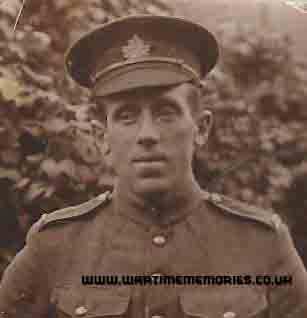Additions will be checked before being published on the website and where possible will be forwarded to the person who submitted the original entries. Your contact details will not be forwarded, but they can send a reply via this messaging system.
please scroll down to send a message
Cpl. William Harry Bathe
Canadian Expeditionary Force Canadian Ordnance Corps
from:Montreal, Canada
William Harry Bathe was born in Deptford, SE London, in 1879. He enlisted in the Royal Marine Light Infantry on 9 August 1897. Although he had signed on for 12 years, he spent 50 days in all with the Marines – and six of those were in hospital, suffering from cowpox, a bad reaction to his smallpox vaccination. On 29 September 1897, he transferred to the Army Ordnance Corps, and his conditions of service changing to seven years in army service and five years with A Reserve.
3653 Private Bathe W H started his duty with the AOC at Woolwich, but spent his first Christmas and New Year in the army in hospital. He was there for 34 days while being treated for rheumatism caused by exposure. He did not stay with his new unit for long, buying himself out of the army for £18 less than a year after joining the AOC, on 10 September 1898. On 28 February 1901, he volunteered to serve in the Second Anglo-Boer War, becoming a private in the 36th Company (West Kent) Imperial Yeomanry. In fact, before he joined the Royal Marines in 1897, he had been a member of 2nd Volunteer Battalion West Kent Regiment. He was a member of the second contingent of Imperial Yeomanry to go to South Africa, on 23 March 1901. On 29 July, his mother Evangeline was refunded £12, two-thirds of the purchase money paid to buy William out of the army three years earlier. William Bathe was awarded the Queen’s South African medal with clasps for his service in Cape Colony, Orange Free State and Transvaal, together with clasps to show he served in South Africa in both 1901 and 1902. At the end of the war, he returned to the UK on 27 August 1902 and was discharged at Aldershot on 3 September. Two years later, he was back in South Africa as a member of the South African Constabulary, serving with the SAC between 1904 and 1906 before returning to England.
In July 1907, he emigrated to Canada, a couple of months after his younger brother George had done so. He lived in Montreal and joined the local militia – the Royal Rifles of Canada. William Bathe enlisted with the Canadian forces soon after WW1 broke out, joining the 12th Battalion of the 1st Canadian Division with service number 23072. He was attested on 29 September 1914 and sailed for England on SS Scotian on 3 October. What William did in the first 11 months of his service in England is unknown, but it has been suggested that he may have been seconded to a civilian armaments factory to learn about modern weapons. He was certainly in Forest Hill on 19 May 1915, when he acted as a witness to his sister Florence’s wedding, but his military records do not resume until 16 September 1915, when he “returned to duty†and was based at Shorncliffe Camp. Later, in early March 1916 he was attached to Canadian Ordnance Corps at Ashford with the rank of Armourer Corporal. In August 1918, he was promoted Acting Armourer Sergeant and finally, in October that year, Acting Armourer Staff Sergeant. During his time with COC, he worked on repairing rifles, spent a few months with the machine gun section and also was based in Greenwich for six months to February 1917 with the Canadian Arms Inspection & Repair Depot. It was not until 27 October 1918 that William served in France, being attached to 2nd Canadian Infantry Battalion as armourer. He remained in France until May 1919 and then returned to the UK and was eventually demobilised in Britain on 2 September 1919.
